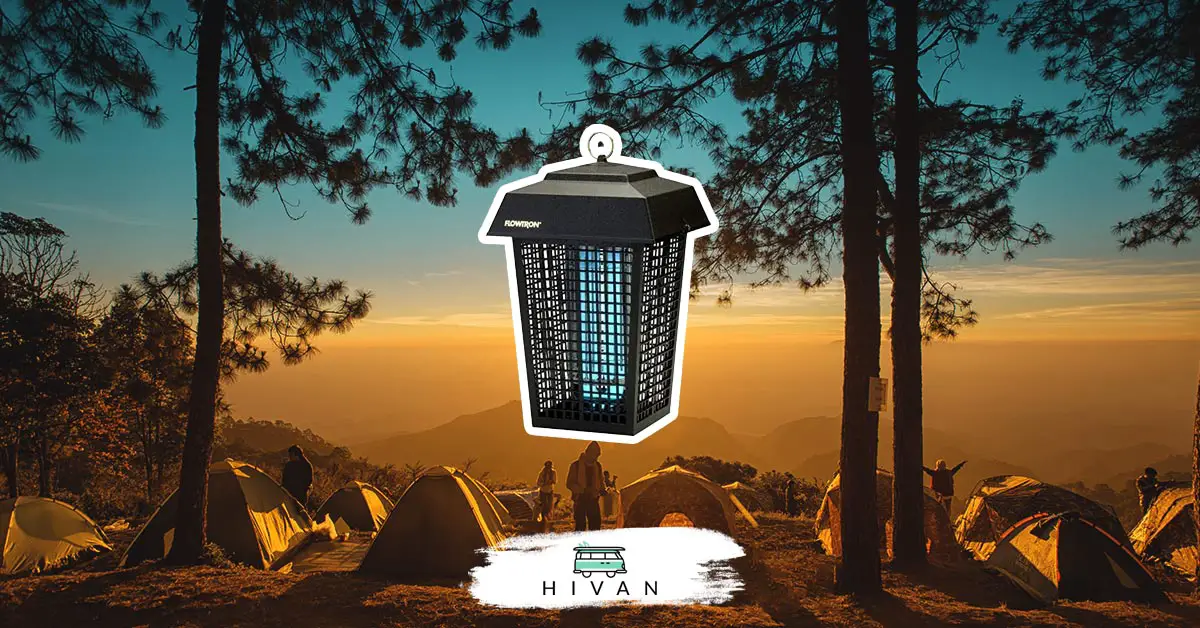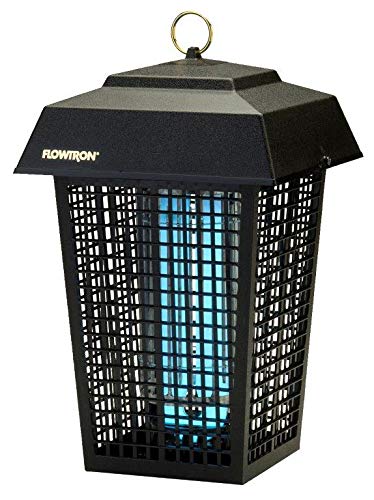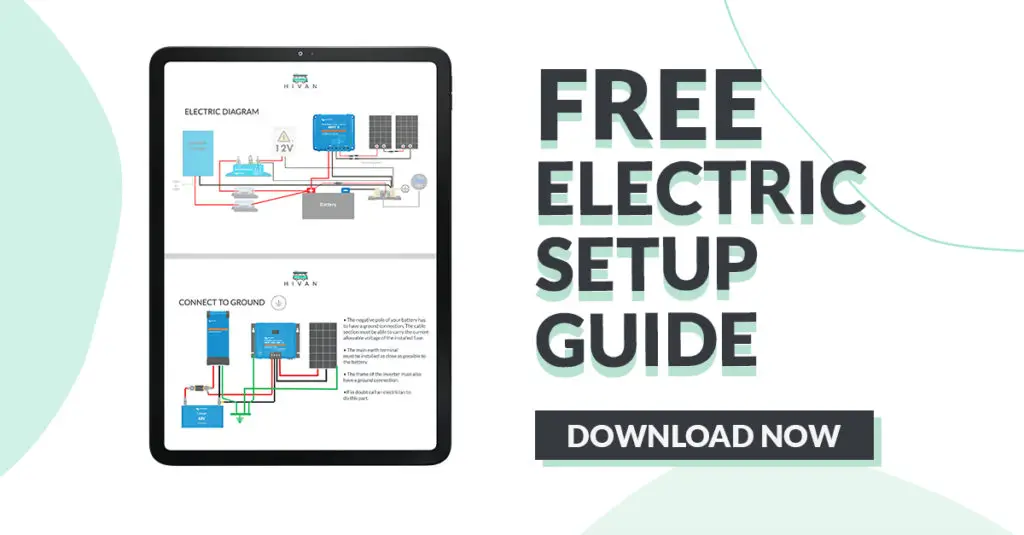Hi-van is supported by its audience. When you purchase using our links, we may earn an affiliate commission (no added cost to you). Learn more
We all want to spend more time outdoors, but nothing ruins a camping trip or outdoor adventure like bugs. Whether you’re camping for the weekend or a few weeks, you’ll want to bring something for pest control. So should you get a bug zapper?

You shouldn’t bring a bug zapper camping if you’re trying to keep mosquitoes away. A bug zapper isn’t effective enough for mosquito control. Instead of killing mosquitoes, bug zappers usually kill other bugs that are particularly attracted to the lights the devices produce.
In this article, we’ll discuss the pros and cons of bringing a bug zapper, as well as some great alternatives to this device.
What Is a Bug Zapper?
A bug zapper is essentially an electric insect killer. Instead of using a bug spray, citronella candle, or another kind of repellent, a bug zapper instantly kills bugs that come near it, ensuring a camp stays free from all kinds of insects.
How Do Bug Zappers Work?
Bug zappers work by attracting insects to a central light, then electrocuting them between two wire grids. Because most insects are attracted to this light, these devices are great at killing bugs.
One bug that bug zappers aren’t great at killing is the mosquito. Bug zappers generally kill far more other bugs than mosquitoes, so if you want to keep mosquitoes away above all else, bug zappers are probably not the best option.
Why Don’t Bug Zappers Kill Mosquitoes?
Bug zappers don’t kill mosquitoes in general because mosquitoes aren’t attracted to them. That said, only a tiny percentage of mosquitoes get electrocuted by these devices. Many other bugs are attracted to the bug zapper’s bright light; thus, many get killed instead of mosquitoes.
Benefits of a Bug Zapper
Just because a bug zapper may not be the best at killing mosquitoes doesn’t mean you won’t benefit from one. Many reasons that may convince you to bring a bug zapper on your next camping trip.
One reason is how natural bug zappers are. Instead of relying on the chemicals that bug sprays and other repellents may use, bug zappers only use light and electricity to get the job done.
Most bug zapper manufacturers also recommend that you leave the device on all night to keep bugs away as long as possible, so using one should keep your camp pest-free while you sleep.
Additionally, bug zappers can double as a light source at your campsite, which you may find easier than bringing both a lantern and another pest control option.
The Best Bug Zappers
If you want to bring a bug zapper camping (even if they aren’t the best option for mosquitoes), many great options are available on Amazon.com.
Rid your outdoor living areas of flying insect pests - without harming the environment! Insect remains, uncontaminated by pesticides, fall to the ground to be naturally reabsorbed into the ecosystem.
The Flowtron BK-40D Electronic Insect Killer is lightweight, affordable, and works both indoors and outdoors. Many reviewers even mentioned that this model did a great job at killing mosquitoes.
Put it on the base,it works as a bug zapper. Built-in purple LED lamp is targeted to attract mosquitoes, automatically kills mosquitoes.
For an even more portable option, you may also opt for this Endbug Bug Zapper Lamp & Fly Swatter Racket, which is rechargeable, well-reviewed, and works well on gnats and flies, and other small insects. It’s also a perfect option if your campsite doesn’t have electrical outlets.
Disadvantages of a Bug Zapper
Bug zappers are great for some campers, but they may not be the best option for others.
If you’re camping somewhere coastal or with lots of stagnant water, for example, you’re going to want to use a different mode of pest control that’s better for mosquitoes.
Most bug zappers also require an electricity source, so if you’re staying somewhere off-grid, a bug zapper probably won’t help very much.
One of the most significant other problems with bug zappers is that they can harm helpful insects. Bug zappers are indiscriminate in killing butterflies and bees, which are super important for ecosystem health.
If you’re a camper that wants to “leave no trace,” bug zappers’ impact on these insects may outweigh the benefits.
Finally, bug zappers can add unnecessary weight if you already have a lot to carry. For campers looking to take a longer trek, consider whether a bug zapper (weighing in between 2 and 3 kg or 4.4 to 6.6 lb.) is worth having in your pack.
Best Bug Zapper Alternatives
For many campers, the negative aspects of a bug zapper outnumber the positive ones. If this is the case for you, you can bring plenty of alternatives for pest control.
The first option almost all campers have used is traditional bug repellent sprays. These sprays use DEET to repel insects, and the more DEET a repellent has, the more effective it’ll be. The downside to these kinds of insect repellents is how harsh the DEET chemical can be.
CDC recommended active ingredient to repel mosquitoes and other harmful biting insects
Opt for a more natural alternative if you don’t want to use a chemical repellent, either because of the smell or the potential to irritate your skin and eyes. There are many recipes online for essential oil repellents, or you could try this Natrapel Insect Repellent Spray from Amazon.com that uses CDC-recommended ingredients for keeping pests away.
Sleeping with an insect repellent on is a good way to prevent insect bites while sleeping, but you’ll still probably want an additional way to keep insects away while camping.
You can also keep white vinegar and apple cider vinegar around your camp to keep away unwanted insects without harming butterflies or other helpful bugs.
Citronella is also naturally great pest control. Burning citronella candles, like these Murphy’s Naturals Mosquito Repellent Candles (also from Amazon.com), are a perfect plant-based solution to camping bug-free.
Finally, try a bug repellent bracelet, like the 10-pack of SUPERBAND Premium Mosquito Repellent Bracelets. These bracelets can be another effective way to enjoy your camping trip free of bug bites.
Related Articles: How Many Citronella Candles Do You Need? Does Bug Spray Repel Spiders?
Final Thoughts
Bug zappers can be a good choice for some campers, especially if you’re looking for a natural, pesticide-free way of killing bugs on your campsite. If you’re worried about mosquitoes, though, bug zappers aren’t your best option.
There are also plenty of other options for repelling insects, such as:
- Essential oils
- Traditional sprays
- Citronella candles
These options, unlike bug zappers, are designed to kill mosquitoes.
If you want to avoid bugs on your next camping trip, a bug zapper may be a perfectly acceptable option. However, if you’re worried about mosquitoes, you’re better off leaving the bug zapper at home.
Find this content useful 🙂 ?
Subscribe to our Newsletter and get a free Solar Electric Diagram + shopping list.




